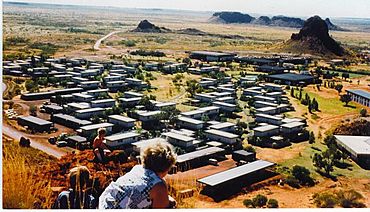Shay Gap, Western Australia facts for kids
Quick facts for kids Shay GapWestern Australia |
|
|---|---|

Shay Gap in 1975
|
|
| Population | 0 |
| Established | 1972 |
| Abolished | 1994 |
| Elevation | 175 m (574 ft) |
| Time zone | AWST (UTC+8) |
| LGA(s) | Shire of East Pilbara |
| State electorate(s) | Pilbara |
Shay Gap was a town in the Pilbara region of Western Australia. It was built for mining iron ore. The town was about 1,335 kilometers (830 miles) north-northeast of Perth. It was also 165 kilometers (103 miles) east of Port Hedland. Shay Gap officially became a town in 1972.
What's in a Name?
Shay Gap got its name from a nearby pass in the hills. This pass has been on maps since 1957. People believe it was named after a man called Robert Shea. He was a part-owner of a pearl diving boat named Seaspray.
In November 1872, Robert Shea and his mate Samuel Miller were killed. This happened during a trip to an area called Mukkine. They were trying to find some pearl divers who had left their work.
A Town Built for Mining
Shay Gap was a special type of town called a company town. This means a company built and owned it. The company was Mount Goldsworthy Mining Associates. They built the town to support their nearby iron ore mines.
A person named Lawrence Howroyd designed the town in 1970. His design was very good. It won an Award of Merit in 1974. This award was part of the Prince Philip Prize for Australian Design.
Mining and Closure
Mining for iron ore started in Shay Gap in January 1973. At its busiest time, over 850 people lived in the town. The mining work stopped on December 10, 1993.
The town of Shay Gap officially closed in February 1994. After it closed, many buildings and structures were moved. Some were sold, and others were taken apart. Many were moved to another mining area called Yarrie.
 | Georgia Louise Harris Brown |
 | Julian Abele |
 | Norma Merrick Sklarek |
 | William Sidney Pittman |


